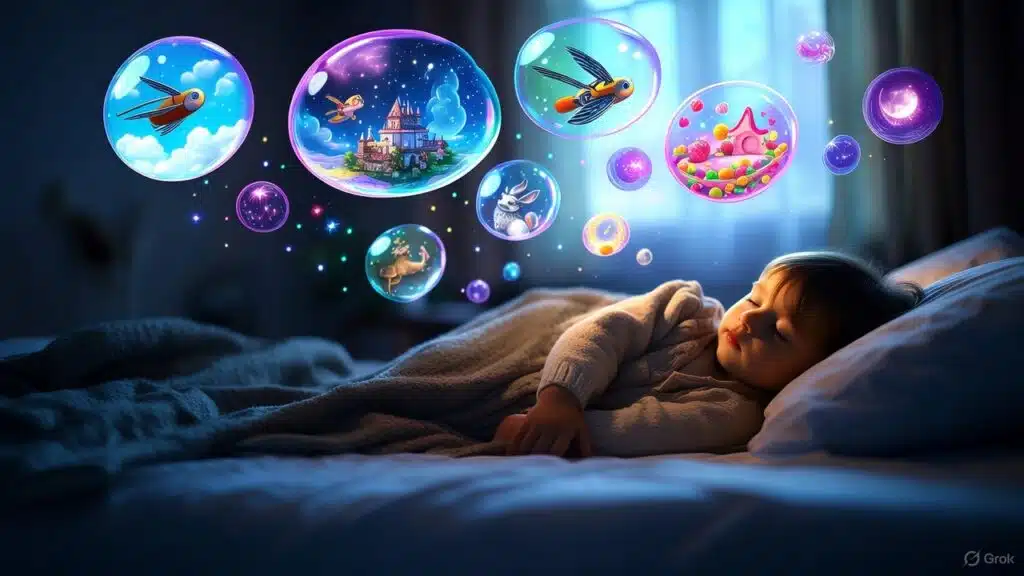The Magic of Sleep
Imagine closing your eyes at night and suddenly flying over a mountain, meeting a talking cat, or running through a candy castle. Then you wake up and realize — it was all just a dream!
But wait — why do we dream? Why does our brain make these strange, exciting, or sometimes scary movies in our sleep? To answer this, let’s first understand the science of sleep.
Why Do We Need Sleep?
Our bodies are like rechargeable batteries. During the day, we use up energy by playing, studying, and moving around. At night, sleep helps us “plug in” and recharge.
Sleep does many important things for us:
- It helps our brain organize memories.
- It repairs our muscles and body tissues.
- It boosts our immune system to fight sickness.
- It gives us energy for a brand-new day!
Without sleep, we’d feel tired, cranky, and unable to focus. That’s why sleep is just as important as eating and breathing.
The Stages of Sleep
When we go to bed, our brain doesn’t just switch off. Instead, it moves through different stages of sleep, almost like levels in a video game:
- Light Sleep – You drift in and out. It’s easy to wake up.
- Deep Sleep – Your body relaxes, and your energy is restored.
- REM Sleep (Rapid Eye Movement) – This is when most dreams happen! Your eyes move quickly under your eyelids, your brain is super active, but your body stays still.
We go through these stages several times every night. Each cycle lasts about 90 minutes. That’s why you might dream more than once in a single night!
What Are Dreams?
Dreams are like stories our brain tells us while we sleep. They can be funny, magical, adventurous, or even scary.
Scientists believe dreams are a mix of:
- Memories – things that happened during the day.
- Feelings – like excitement, happiness, or fear.
- Imagination – random ideas your brain puts together.
That’s why you might dream about eating ice cream with your teacher or playing soccer on the moon. Your brain is connecting random pieces of information like a puzzle!

Why Do We Dream? The Theories
Scientists don’t fully agree on why we dream, but here are some cool theories:
- Memory Sorting – Dreams help organize our day’s experiences, deciding what to keep and what to forget.
- Problem Solving – Sometimes, our brain works on problems while we dream. That’s why people say, “sleep on it.”
- Emotional Balance – Dreams help us process feelings like fear, joy, or sadness.
- Random Firing – Some scientists believe dreams are just our brain’s random activity while it rests.
So, are dreams important? Yes! Even if we don’t understand them fully, they may help keep our brains healthy and creative.
Fun Fact: Everyone Dreams!
Even if you don’t remember your dreams, you still have them. Most people dream 4–6 times every night! Some people remember them clearly, while others forget as soon as they wake up.
Daydreams vs. Night Dreams
Did you know there are two kinds of dreams?
- Night Dreams – Happen while we sleep.
- Daydreams – When we let our minds wander while awake.
Daydreaming can be fun, too — it’s like practicing imagination while you’re awake!
Can We Control Our Dreams?
Sometimes people have lucid dreams. This means they realize they are dreaming and can control what happens. Imagine being able to choose to fly like a superhero or build your own magical castle inside your dream!
Lucid dreaming is rare but very exciting when it happens.

Nightmares: The Scary Side of Dreams
Not all dreams are fun. Sometimes we have nightmares — scary dreams that can wake us up feeling frightened.
Why do nightmares happen?
- Stress or worry.
- Watching a scary movie before bed.
- Eating too much junk food late at night.
The good news is nightmares are normal and usually harmless. Talking about them with parents or drawing a picture of the dream can make them less scary.
Dream Myths and Legends
Throughout history, people have wondered about dreams.
- Ancient Egyptians thought dreams were messages from the gods.
- Some cultures believed dreams could predict the future.
- Today, scientists see dreams as a window into how our brain works.
Even though we now know dreams are part of brain activity, they still feel mysterious and magical.
Tips for Better Sleep (and Better Dreams!)
Want to have sweet dreams? Here are some tips:
- Stick to a bedtime routine. Go to bed and wake up at the same time.
- Avoid screens before bed. Phones and TVs can trick your brain into staying awake.
- Keep your room cool and dark. This helps your brain relax.
- Read a calm story before bed. It can give your imagination nice ideas for dreams.
- Don’t eat heavy snacks late at night. Your stomach needs rest too!
Why Dreams Are Important for Kids
Dreams aren’t just random — they help kids grow smarter and more creative. Some of the greatest ideas in history came from dreams!
- A famous scientist, Albert Einstein, said daydreaming helped him imagine big ideas about the universe.
- The idea for the sewing machine was inspired by a dream.
- Even songs and books have come from people’s dreams!
So, your dreams could one day inspire something amazing too.
Conclusion: The Mystery Continues
So, why do we dream? The truth is, scientists don’t fully know yet. Dreams may help us with memory, emotions, creativity, or maybe they’re just our brain’s way of having fun while we rest.
What we do know is this: sleep is essential, and dreams make it magical. So next time you close your eyes, get ready for an adventure — because who knows where your dreams will take you tonight?

